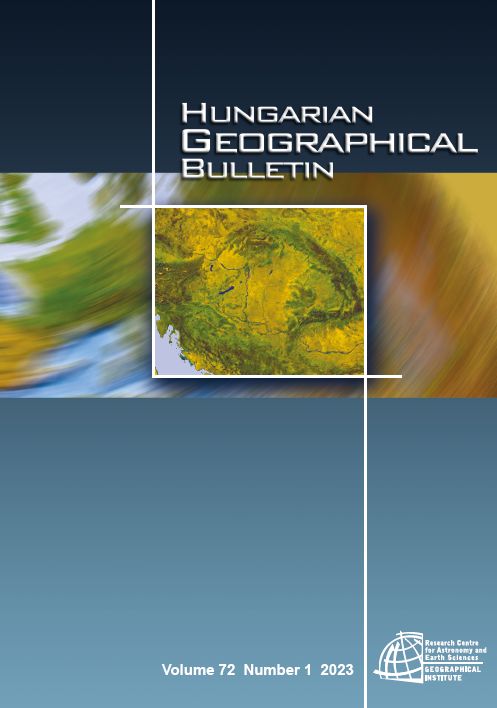A new way to understand urban-rural relations: Habitus studies of rural places
Abstract
“Taken for-granted divisions of geographic space (such as centre and periphery) must be viewed according to Bourdieu, as the effect of distance in social space, i.e. the unequal distribution of the different kinds of capital in geographical space” – as Reed-Danahay, D. (2020, 17) puts it in their book about the spatial aspect of Pierre Bourdieu’s action theory. Field, social space, capital, disposition, and habitus are all essential components of Bourdieu’s theory, but what about places? This paper focuses on the importance of geographical space, place and scales in a habitus analysis and tries to show the possibilities the concept of habitus can offer in spatial studies. While research on the relationship between Bourdieu’s concept of habitus and spatiality is becoming increasingly popular (Berger, V. 2018; Németh, K. 2020; Reed-Danahay, D. 2020), still few scholars (e.g. Máté, É. et al. 2022) undertake place-based habitus analyses. The present paper aims to provide an overview of the international academic discourse on place-based (in this case mainly rural) habitus analysis. Considering a dozen empirical studies from different perspectives and in different geographical areas, I focus on the specificities of habitus analysis in rural places. After briefly introducing the concept of habitus and its critiques, I will describe the characteristics of habitus studies in rural places by presenting various views. Then, I will show how the relationship between rural and urban habitus studies suggests that habitus does indeed contribute to the persistence of urban-rural structures.
References
Bender, S. 2005. Of roots and race: Discourses of body and place in Japanese "Taiko" drumming. Social Science Japan Journal 8. (2): 197-222. https://doi.org/10.1093/ssjj/jyi038
Benson, M. and Jackson, E. 2012. Place-making and place maintenance: Performativity, place and belonging among the middle classes. Sociology 47. (4): 793-809. https://doi.org/10.1177/0038038512454350
Berger, V. 2018. Térré szőtt társadalmiság (Space formed by sociality). Budapest, L'Harmattan.
Blondeel, P. 2005. Reading and (re)writing the city: the use of the habitus concept in urban research and development. Paper for the international conference: Doing, thinking, feeling home: the mental geography of residential environments. 14-15 October 2005, Delft, The Netherlands.
Bourdieu, P. 1977. Outline of a Theory of Practice. Cambridge, Cambridge University Press. https://doi.org/10.1017/CBO9780511812507
Bourdieu, P. 1990. The Logic of Practice. Cambridge, Polity Press. https://doi.org/10.1515/9781503621749
Bourdieu, P. 1996. Physical Space, Social Space and Habitus. Oslo, Institut for sociologi og samfunnsgeografi.
Bourdieu, P. 2000. Pascalian Meditations. Stanford CA, Stanford University Press.
Bourdieu, P. 2009. A gyakorlat elméletének vázlata & Három kabil etnológiai tanulmány (Outline of at theory of practice & Three etnographic studies on kabils). Budapest, Napvilág Kiadó.
Casey, E.S. 2001. On habitus and place: Responding to my critics. Annals of the Association of American Geographers 91. (4): 716-723. https://doi.org/10.1111/0004-5608.00270
Corbett, M. 2004. 'It was fine if you wanted to leave': Educational ambivalence in a Nova Scotian coastal community 1963-1998. Anthropology & Education Quarterly 35. (4): 451-471. https://doi.org/10.1525/aeq.2004.35.4.451
Dirksmeier, P. 2006. Habituelle Urbanität. Erdkunde 60. (3): 221-230. https://doi.org/10.3112/erdkunde.2006.03.02
Entrikin, J.N. 2001. Hiding places. Annals of the Association of American Geographers 91. (4): 694-697. https://doi.org/10.1111/0004-5608.00267
Fáber, Á. 2017. Pierre Bourdieu 'politikai fordulata' (Pierre Bourdieu's 'political turn'). Doctoral dissertation. Budapest, ELTE TáTK.
Fabula, Sz., Skovgaard Nielsen, R., Barberis, E., Boros, L., Hedegaard Winther, A. and Kovács, Z. 2021. Diversity and local business structure in European urban contexts. Hungarian Geographical Bulletin 70. (1): 65-80. https://doi.org/10.15201/hungeobull.70.1.5
Funnell, R. 2008. Tracing variations within 'rural habitus': an explanation of why young men stay, or leave isolated rural towns in Southwest Queensland. British Journal of Sociology of Education 29. (1): 15-24. https://doi.org/10.1080/01425690701728720
Hadas, M. 2021. Outlines of a Theory of Plural Habitus. Bourdieu Revisited. London, Routledge. https://doi.org/10.4324/9781003179702
Ilahiane, H. 2001. The social mobility and the re-working of Bourdieu's habitus on the Saharan frontier, Morocco. American Anthropologist New Series 103. (2): 380-394. Jackson, P. 2008. Pierre Bourdieu, the 'cultural turn' and the practice of international history. Review of International Studies 34. (1): 155-181. https://doi.org/10.1525/aa.2001.103.2.380
King, A. 2000. Thinking with Bourdieu against Bourdieu: A 'practical' critique of the habitus. Sociological Theory 18. (3): 417-433. https://doi.org/10.1111/0735-2751.00109
Koo, A., Ming, H. and Tsang, B. 2014. The doubly disadvantaged: How return migrant students fail to access and deploy capitals for academic success in rural schools. Sociology 48. (4): 795-811. https://doi.org/10.1177/0038038513512729
Lai, L. 2016. Hygiene, Sociality, and Culture in Contemporary Rural China. Amsterdam, Amsterdam University Press. https://doi.org/10.1017/9789048527007
Lindner, R. 2003. Habitus der Stadt - ein kulturgeographischer Versuch. Petermanns Geographische Mitteilungen 147. (2): 46-60.
Ling, M. 2015. "Bad students go to vocational schools!": Education, social reproduction and migrant youth in urban China. The China Journal 73. 108-131. https://doi.org/10.1086/679271
Lipstadt, H. 2008. 'Life as a ride in the metro': Pierre Bourdieu on biography and space. In Biographies and Space. Placing the Subject in Art and Architecture. Eds.: Arnold, D. and Sofaer Derevenski, J., New York, Routledge, 35-54.
Máté, É., Pirisi, G. and Trócsányi, A. 2022. Városi, falusi, mindkettő, egyik sem? Társadalmi habitusvizsgálat egy Tolna megyei falu, Gerjen példáján (Urban, rural, both, neither? A social habitus study exemplified by Gerjen, a village in Tolna County). In A vidéki Magyarország a pandémia korában: IX. Falukonferencia, Pécs, PTE, 185-196.
McClelland, K. 1990. Cumulative disadvantage among the highly ambitious. Sociology of Education 63. (2): 102-121. https://doi.org/10.2307/2112857
Molotch, H., Freudenburg, W. and Paulsen, E.K. 2000. History repeats itself, but how? City character, urban tradition, and the accomplishment of place. American Sociological Review 65. (6): 791-823. https://doi.org/10.2307/2657514
Németh, K. 2020. Marginalizált térből átmeneti térbe. Egy térbeli-társadalmi mobilitási pálya megélt jelentései (From marginalized space to transitional space. Lived meanings of a spatio-social mobility trajectory). Szociológiai Szemle 30. (2): 50-71. https://doi.org/10.51624/SzocSzemle.2020.2.3
Németh, K. 2022. From the pluralisation of habitus towards the theory of plural habitus. European Journal of Social Theory E-publication, 1-5. https://doi.org/10.1177/13684310221117769
Neuhaus, F. 2015. Emergent Spatio-temporal Dimensions of the City. London, Springer. https://doi.org/10.1007/978-3-319-09849-4
Pini, B., Price, R. and McDonald, P. 2010. Teachers and the emotional dimensions of class in resource- affected rural Australia. British Journal of Sociology of Education 31. (1): 17-30. https://doi.org/10.1080/01425690903385345
Reay, D. 2004. 'It's all becoming a habitus': Beyond the habitual use of habitus in educational research. British Journal of Sociological Education 25. (4): 431-444. https://doi.org/10.1080/0142569042000236934
Reed-Danahay, D. 2020. Bourdieu and Social Space. New York, Berghahn. https://doi.org/10.2307/j.ctv1dwq1m3
Requena-i-Mora, M. and Moreno, G.M. 2019. Another turn of the screw on the environmental opinions: Utilizing surveys and social discourses to investigate the social perception of environmental issues. Conservation & Society 17. (1): 38-50. https://doi.org/10.4103/cs.cs_16_48
Sági, M. 2022a. The geographical scales of fear: Spatiality of emotions, emotional spatialities. Hungarian Geographical Bulletin 71. (1): 55-65. https://doi.org/10.15201/hungeobull.71.1.4
Sági, M. 2022b. Kern, L.: Feminist City: Claiming Space in a Man-made World. Book review. Hungarian Geographical Bulletin 71. (3): 301-308. https://doi.org/10.15201/hungeobull.71.3.6
Shavit, Z. 2013. The bourgeois construction of the rural. Israel Studies Review 28. (1): 98-119. https://doi.org/10.3167/isr.2013.280107
Seeberg, V. 2014. Girls' schooling empowerment in rural China: Identifying capabilities and social change in the village. Comparative Education Review 58. (4): 678-707. https://doi.org/10.1086/677774
Timár, J. and Velkey, G. 2016. The relevance of the political economic approach: The interpretations of the rural in the migration decision of young women and men in an economically backward region. Journal of Rural Studies 30. 1-12. https://doi.org/10.1016/j.jrurstud.2015.11.012
Wacquant, L. 2007. Territorial stigmatization in the age of advanced marginality. In Urban Outcasts: A Comparative Sociology of Advanced Marginality. Ed.: Wacquant, L. Cambridge, Polity Press, 66-77. https://doi.org/10.1177/0725513607082003
Watt, P. 2009. Living in an oasis: Middle-class disaffiliation and selective belonging in an English suburb. Environment & Planning 41. (12): 2874-2892. https://doi.org/10.1068/a41120
Copyright (c) 2023 Vanda Jóvér

This work is licensed under a Creative Commons Attribution-NonCommercial-NoDerivatives 4.0 International License.






